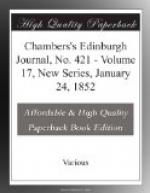The author of this strange melange, however, is not without a dash of merit; he possesses a terrier-like power of poking about into holes and corners, and dragging to light a variety of facts which might escape the attention of less vigilant tourists. For example, he is not satisfied with the mere sight or employment of omnibuses, street-porters, chiffonniers, and other agents of the public service, but must know all about them—how the omnibus horses live, and how many miles they run per diem; what variety of occupations the porters resort to for a livelihood; and what are the substances, and their value, that the chiffonniers scrape every morning from the kennel. Sir Francis is great on pig slaughter-houses, furnished lodgings, and police-officers. He tells you every particular of his lodging: how he ascended the stair; what landing-places there were; what price he was to pay; how the servant brought him too few pieces of butter to breakfast, and what he said in ordering more; how one day he perceived a bad smell in his sitting-room, and shifted to a higher part of the building, where the bad smell did not come; how he finally paid his account, and how the concierge bade him good-by. All important information this. An equally true and particular narrative is given of Sir Francis’s object in visiting Paris, which was to consult an occulist on the subject of his eyes. In going to the occulist’s, we are informed how he left his lodgings at a quarter before seven o’clock; how he crossed the Place Vendome, and saw a sentinel pacing at the foot of Napoleon’s Column; how he observed that the sentinel had the misfortune to have a hole in his greatcoat, which affords an opportunity too good to be lost for quoting that little-known verse of Burns’s—’If there’s a hole in a’ your coats,’ &c.; how he then, being done with looking at the sentinel, goes on his way, crosses the Boulevard des Italiens, and enters the Rue de la Chaussee d’Antin; how he looks about him till he sees No. 50, and, having spoken a word to the door-keeper, goes up stairs. Then, he informs his readers that he rang the doctor’s bell; and how, the door being opened by a boy in livery, he was shewn into a drawing-room. Here, he tells us, he sat down in company with a number of other patients, waiting their turn to be called by the doctor. Vastly amusing all this, but nothing to what follows:—’For a considerable time we all sat in mute silence, and, indeed, in our respective attitudes, almost motionless, save that every now and then a gentleman, and sometimes a lady, would arise, slowly walk diagonally across the carpet to a corner close to the window, press with his or her hand the top of a little mahogany machine that looked like an umbrella-stand, look down into it, and then very slowly, at a sort of funereal pace, walk back. All this I bore with great fortitude for some time: at last, overpowered by curiosity, I arose, walked slowly and diagonally across the carpet, pushed the thing in the corner exactly as I had seen everybody else push it, looked just as they did, downwards, where, close to the floor, I beheld open, in obedience to the push I had given from the top, the lid of a spitting-box, from which I very slowly, and without attracting the smallest observation, walked back to my chair.’ Wonderful power of description this!




